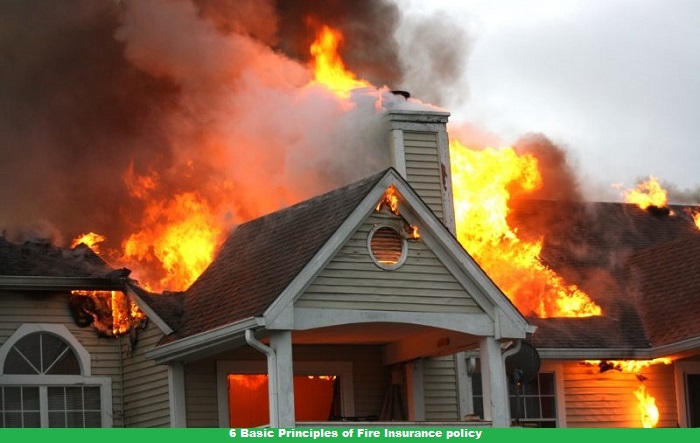Fire insurance is a type of insurance policy that protects your house or company if there is any fire outbreak. The fire insurance policy helps you to recover from the damages of fire. It puts you back on the same financial state where you were before the loss occurred. A fire insurance policy is necessary. It’s a must-have in your portfolio. Furthermore, there are some guiding principles of the fire policy. Thus this article will talk about the 6 major principles of fire insurance.
6 Principles of Fire Insurance policy!
There are many types of fire insurance principles. The basic principles of fire insurance are:
#1. Utmost good faith:
When you are applying for a fire insurance policy you have to disclose all your assets that you possess. It is the principle of utmost good faith. The insurance will ask you to submit a detailed report about your belongings. You should disclose all your assets that come under fire protection policy. You have to be true about your disclosure. If the list that you are submitting is found to be false information your fire protection policy will terminate. Another thing to keep in mind is that you have to update your assets throughout the policy period. This policy also tells you to safeguard your assets with the utmost care.
The policy tells you to always think that as if your house or property is uninsured. You have to act responsibly. Now, if your property suffers any loss or damages due to fire the policy helps you to recover as much property as possible.
#2. Insurable Interest:
The insurable interest policy is the heart of the insurance policy. It is one of the most important principles of fire insurance. Without insurable interest, it is like a gamble. It gives the insurance policy a legal validity. The insurance interest should be present in the policy throughout the period. The clause should be present when you are taking the policy. It should continue throughout the period and it should exist at the time of claim.
Also read: 11 Insurance Policies That Will Keep Your Business Safe!
Also, a fire insurance policy is more like a personal contract. If you sell your property the fire insurance lapses. This policy is non-transferable.
#3. Indemnity:
The objective of an insurance policy is to put you in the same financial state where you were before the loss. The insurance policy is clearly not a mode of profit. It only can put you in the place where you were before the loss happened. When you suffer a loss due to fire the policy scrutinizes the market value of the property.
In the case of personal property like home, the market value is decided by the present cost to construct a similar type of building. After the cost is decided the insurance company deducts the depreciation value depending on the age of the building, how much you have used it, and how the building was maintained. These factors decide the market value of the house and the insurance company pays you the market value of the house. Similarly, the same case happens in the industrial sector. You receive the market value of the plant and machinery. After deducting the depreciation for age, usage, and wear and tear the insurance company decides the market value of your belongings.
#4. Subrogation:
The fourth principle of fire insurance is the principle of subrogation. It is the corollary of the principle of indemnity. The clause says that if the insured suffers a loss due to the third party’s negligence the rights of recovery are subrogated to the insurers. If the insured has already received the amount of the loss from the insurance company, the money from the third party belongs to the insurance company. The company will only take the money that they have disbursed and if anything is left it belongs to the insured. If the third party pays earlier then the insurance company is free from liability.
#5. Warranties in Fire Insurance:
When you are applying for the fire insurance the warranty comes with the proposal form. In this proposal form, the insured has to undertake some conditions. He also undertakes some things he should not do. The warranties written in the policy are called express warranties, and the warranties not written in the policy are called implied warranties. Implied warranties are that the structure of the house should be permanent. It should not be of inferior quality. There should be a fire extinguishing device present in the house. And that you have to do maintenance work at regular intervals.
#6. Proximate Cause of Fire Insurance:
It is a very important principle of the fire insurance policy. The proximate cause of the fire is a natural and uninterrupted consequence. Without this process, there would have been no injury or loss. It is also known as a legal or direct cause. Suppose your property suffers but the fire generated by an expected peril then the insurance company is going to investigate if the expected peril was proximate or not. If it was proximate then the insurance company is going to bear the loss that you have suffered due to fire. But if the fire was not proximate it may void your claim.
Conclusion
A lot of insurance companies are available in the market USAA, Amica, etc. Each has different types of policies. So before you buy any fire insurance policy first read the policy. See if the insurance policy is suitable for you. If you don’t understand the policy ask the agent. Clear your thoughts before buying the policy. Take advice from a financial advisor if you feel like consulting to one. You should not purchase a policy unless you are sure about it. Make it clear what the policy is going to offer you. What kind of protection you will receive from the company when you need it.
If you like this article please share it with your friends. If you have any doubts about any of the principles of fire insurance, feel free to comment in our comment box below.







